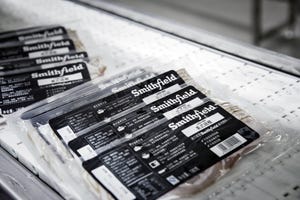Legislative Watch: CFAP deadline extended with additional commodities; beef supply chain to be analyzed; Senators oppose fertilizer duties; aluminum tariffs re-imposed; record corn yields; Biden picks Harris.

USDA announced it is extending the sign-up deadline for the Coronavirus Food Assistance Program until Sept. 11. In addition, the USDA added additional commodities that would be eligible for CFAP including all sheep (previously only lambs and yearlings were eligible) bananas, dates, dill, horseradish, pumpkins, catfish, crawfish, trout, nursery crops and cut flowers.
A group of agricultural organizations called on the USDA last week to extend the Aug. 28 deadline for producers to sign up for the CFAP saying the current deadline could exclude eligible producers and producers of commodities recently added to the list.
In a letter to Secretary of Agriculture Sonny Perdue, the group says the 499,156 applications received represent only 24% of farm operations. The group say, "the disparity between approved applications and the number of farm operations points toward the need for additional farmer and stakeholder engagement and a sign up deadline extension."
Those signing the letter include the Agricultural Retailers Association, American Farm Bureau Federation, American Sheep Industry Association, National Cattlemen's Beef Association, National Council of Farmer Cooperatives, National Milk Producers Federation and U.S. Apple Association.
House ag leaders ask USDA to analyze cattle and beef supply chains
Congressmen Collin Peterson (D-MN), chairman of the House Agriculture Committee, and Mike Conaway (R-TX), ranking member, are asking the USDA to work with university policy research centers to analyze issues related to the beef industry as a result of the ongoing coronavirus pandemic.
Peterson and Conaway ask that USDA's chief economist work with the universities to evaluate cattle market structure, price discovery, price reporting, purchasing mandates and barriers to entry in the packing sector.
In addition, the letter also specifically asks for the analysis to address the following questions.
How did the sector get to its current structure and what are its advantages and disadvantages for producers as well as consumers?
Is the current capacity sufficient for the industry to thrive and grow?
What are the impediments to expansion for both new and existing firms of varied sizes?
Are there policy options to expand capacity or increase price discovery regionally or nationally, and would those options address current concentration and supply chain vulnerability concerns?
What common success factors for small to medium packing plants, including producer-owned processing can be documented, and is there a set of generalizable strategies for success?
Senators oppose duties on imported fertilizer
The U.S. International Trade Commission last week ruled in favor of a petition filed by Mosaic determining imports of phosphate fertilizers from Morocco and Russia harmed U.S. fertilizer producers.
As a result of this ruling, the Department of Commerce will continue with it countervailing duty investigations on imports of fertilizer from Morocco and Russia. Commerce is expected to issue its preliminary determination in late-September.
Earlier this month, Sen. Jerry Moran (R-KS) and seven other Senators asked the ITC and Commerce to oppose the petition and urged the ITC and Commerce to reject the imposition of duties.
The Senators in a letter say, "Phosphorous accounts for approximately 20% of fertilizer usage and 15% of total cash costs for producers. The imposition of duties between 30.72% and 71.50% on phosphate fertilizers, as sought by the petitioner, would result in higher input costs for U.S. farmers."
Mosaic is the largest U.S. producer of phosphate fertilizers.
Trump re-imposes tariffs on Canadian aluminum
Canada announces it will retaliate with $2.69 billion in tariffs on U.S. goods in response to President Trump reinstating a 10% tariff on Canadian unalloyed and unwrought aluminum. Trump says he was re-instating the tariffs because of a surge in aluminum imports from Canada to the United States in recent months.
Canada is considering tariffs on a number of U.S. products including golf clubs, bicycles, refrigerators, washing machines, tripods and sports equipment such as bats and hockey sticks. The Canadian tariffs would go into effect in September.
The Aluminum Association says imports from Canada rose from February to March, but have since leveled off and dropped from May to June.
The tariffs were originally imposed in 2018 but were removed as an incentive to get Canada to negotiate the U.S.-Mexico-Canada Agreement.
USDA estimates record corn yields
USDA's latest "Crop Production" report is forecasting increased corn and soybean production. Corn production is estimated at a record high of 15.3 billion bushels, a 12% increase over last year. Average corn yield is forecast at a record high 181.8 bushels per acre, an increase of 14.4 bushels over last year.
Soybean production is forecast at 4.42 billion bushels, an increase of 25% from 2019. Average soybean yield is estimated at a record high 53.3 bushels per acre, an increase of 5.9 bushels over last year.
Biden picks Harris for VP
Joe Biden selected Sen. Kamala Harris (D-CA) as his vice presidential running mate. During her time in the Senate, Harris voted in favor of the 2018 farm bill, cosponsored legislation to increase funding for trade promotion programs (Foreign Market Development and Market Access Program), supported increased broadband access and immigration reform. She was one of 10 Senators to vote against USMCA.
If elected Harris would be the first woman to hold one of the nation's two highest offices, the first Black woman to be vice president and the first Asian American on a major party's national ticket. Harris was elected to the Senate in 2016 after serving as California attorney general.
Source: P. Scott Shearer, who is solely responsible for the information provided, and wholly owns the information. Informa Business Media and all its subsidiaries are not responsible for any of the content contained in this information asset. The opinions of this writer are not necessarily those of Farm Progress/Informa.
About the Author(s)
You May Also Like


